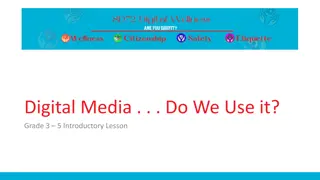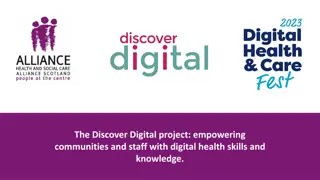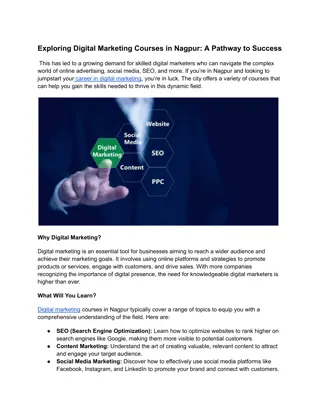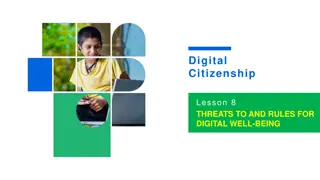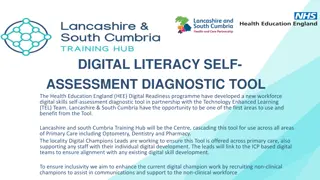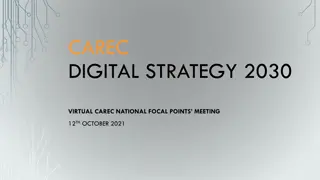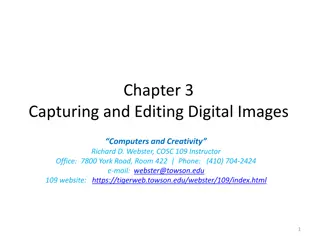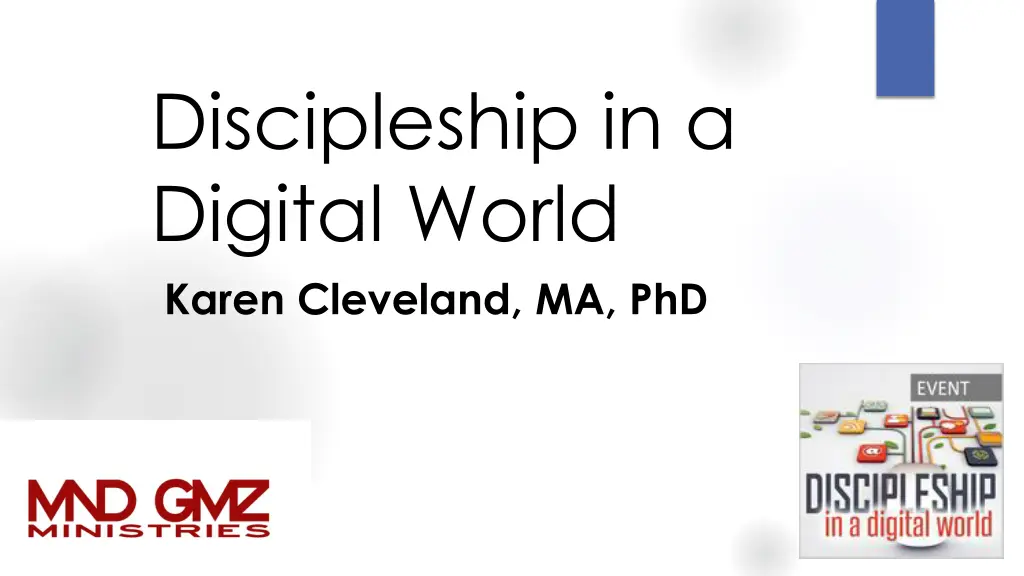
Digital Age Discipleship Insights
Explore the impact of technology on relationships and spiritual seeking in today's digital age. Reflect on the evolving trends in online communication and screen time recommendations, alongside the challenges faced by youth in navigating popularity and self-identity. Gain valuable perspectives on balancing technology use with real-life connections and striving for spiritual fulfillment amidst the digital era.
Download Presentation

Please find below an Image/Link to download the presentation.
The content on the website is provided AS IS for your information and personal use only. It may not be sold, licensed, or shared on other websites without obtaining consent from the author. If you encounter any issues during the download, it is possible that the publisher has removed the file from their server.
You are allowed to download the files provided on this website for personal or commercial use, subject to the condition that they are used lawfully. All files are the property of their respective owners.
The content on the website is provided AS IS for your information and personal use only. It may not be sold, licensed, or shared on other websites without obtaining consent from the author.
E N D
Presentation Transcript
Discipleship in a Digital World Karen Cleveland, MA, PhD
What is your relationship with technology? Does your phone go everywhere with you? How do you feel when your phone isn t with you? Are you receiving more enjoyment from technology than from real-life connections?
Seek the Kingdom of God above all else, and live righteously, and He will give you everything you need. Matthew 6:33 What are you seeking?
Digital age breakdowns 35 year olds had email/chat rooms in HS, MSN/AOL Messenger in college, MySpace after college, immigrants 25 year olds had MySpace in high school, FaceBook in college, bilingual 15 year olds don t know life without social media, it s their native tongue Popularity then v. Popularity now.
At arguably the most awkward time in their lives, a crucial time of development when they are trying to figure out who they are and where they belong, this is what they re up against: a quantifiable popularity ranking. ~Sarah Brooks
Screen time recommendations: 0-2 no screen time (need face to face)* 3-5 1 hr/day (need make believe)* 6-12 90 minutes/day** 13-18 2 hrs/day** *Most are spending on average 4.5 hours per day. **Most are spending on average 8 hours per day.
Why Mr. Rogers is smarter than Baby Einstein Overstimulation hypothesis Number of screen changes. (BE: 1 every 3 secs) When compared to a child who watch no TV prior to age 3: For every hour increase of TV watched per day, there is a 10% increase in the probability of attention problems by age 7. For every hour of cognitive stimulation, there is a 30% decrease in probability of attention problems by age 7.
Brain changes Pleasure system addiction, developing prefrontal cortex and lack of self-regulation Tranquility system increased cortisol and anxiety Memory system declining short term memory, myth of multi-tasking Learning system over fatigued brain Loss of grey matter loss of depth of thought (Nicholas Carr - The Shallows)
Sleep Disturbance The alarm clock issue. Social and Communication Skills Need to control conversation Fear of the phone/Fear of face to face Lack of conflict resolution skills The Great Disconnect and lack of empathy. Illusion of companionship without demands of friendship. Illusion of friendship without demands of intimacy.
What does it look like to have a healthy relationship with tech?
Anything you cannot fast from, owns you. ~Diane Langberg When was the last time you turned your phone off for an entire day?
You say, I am allowed to do anything but not everything is good for you. And even though I am allowed to do anything, I must not become a slave to anything. ~I Corinthians 6:12 NLT
We feel like we need more but deep down we know what we really need is less: Less amusement. More musing. Less entertainment. More creating. Less sitting. More moving. Less multitasking. More focus. Less watching. More reading. Less texting. More talking. Less screentime. More outdoor time. Less comfort. More adventure. Less apathy. More passion. Less self-centeredness. More serving. Less of me. More of God. #STRUGGLES
What can we do? Have candid, thoughtful, caring conversations. Three conversations: Others, Self, God Develop empathy. (Face to Face, Serving others) Cultivate your inner life through silence and solitude. (Psalm 46:10, Mark 6:31, Psalm 62) Limit your selfies and find ways to use social media that are positive. Think twice, post once. (Eph 5:15-17) Play together! Especially outside! Guard your heart for it is the wellspring of life! Seek only God s Kingdom and live rightly!
Utilizing social media in Godly ways: What you put on social media are the things within your heart. Let your heart be filled with Godly things and make them evident to others. Edify and encourage others. Invite others to teaching/learning opportunities. Teach others what God is teaching you. Be a peacemaker Romans 12:18 1 Peter 2:23-25
The Digital ABCs Digital Agreement Digital Boundaries Digital Consequences
Ten Commandments of Using Social Media Put God first in all you say and post. Love others as you want to be loved. Use social media to facilitate, not replace, real relationships. Use social media instead of being controlled by it as an idol. Turn your virtual other cheek to posts that offend you. Do not post out of emotion. Always reflect Jesus, loving God whether online or off. Do not use social media to fuel temptation. Form your own opinions; do not follow the crowd. Do not base your identity on what people think.
How do we know if technology is in its proper place in our lives? By how well we love one another. It s hard to wash someone s feet with a phone in your hand. ~Craig Groeschel #struggles
What teens want parents to know about social media: Don t friend your child s friends. The really heavy stuff that makes you panic is probably a song lyric. Don t complain about your child s teacher online. Don t complain about child s discipline problems online. Don t brag too much about them they feel embarrassed. Don t embarrass them (they think this offline too). Don t post about potty training. Don t post embarrassing photos without asking. Don t assume they can take a joke. Don t comment on all of your child s posts. Don t tag your child in EVERYTHING you post. Don t get involved in the online drama.
Sex and Tech 1 in 5 teenage girls have posted nude/semi- nude picture of themselves. Largest consumer of pornography are teens age 12-17. 90% of children have viewed pornography online most often unintentionally and 79% of the time in the home. 1/3 of 16 and
Sex and Tech Technology deletes the pause button between thought and action. Adolescent development involves: emotional intensity/impulsivity/risk-taking a quest for autonomy a quest for identity a search for intimacy.
Message to Teenagers: 1. You are more than your online image. 2. You ll make mistakes but the goal/hope is don t do anything to embarrass you or your family. 3. Adults are here to help you and guide you. (Remember parents are learning too so be patient and empathic.)
Message to Parents: Approachable parents aren t: 1. Scary they don t react in anger. 2. Crazy overprotect in meddling ways. 3. Clueless want to be friend instead of parent OR are too old-fashioned. I will not be mad at you. There is nothing you can tell me that I can t handle. Teens speak a different language. Don t assume. Ask questions, be patient, seek understanding. Slow to speak and quick to listen.





